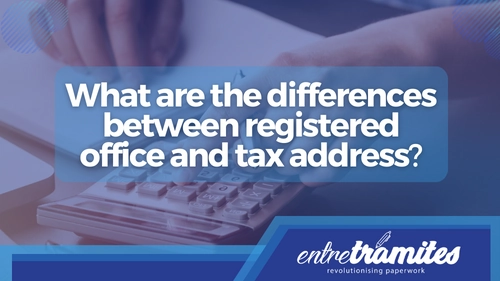The differences between the registered office and tax address are very subtle, which can make this subject a bit confusing. However, although the line that separates these two addresses is very thin, the truth is that it is important to know how to distinguish one from the other, especially when starting and setting up your own company. Mainly when we are dealing with commercial companies, both types of addresses will have different applications that may or may not coincide with the objectives and interests of the company.
What is the tax address?
The tax address, also called fiscal address, “is the location of the taxpayer in their relations with the Tax Administration”, as defined by the Tax Agency. Therefore, notifications from the Tax Agency will be sent to the address you specify.
The Tax Agency also defines in detail the tax address as:
“The place of location of the taxpayer in their relations with the Tax Administration and the one that determines the affiliation to a specific tax office”.
Once we have registered as entrepreneurs, we will have to choose the tax address through Form 036. This can be modified at any time by presenting Form 036 again. In this way, the tax address varies according to the following:
- For Natural Persons, it is the habitual residence.
- For Natural Persons who carry out an economic activity (such as self-employed workers), it refers to the place where they carry out that activity.
- For Legal Entities, it usually coincides with the registered office, although this does not necessarily have to be the case.
To change the tax address, you must notify the Tax Agency, although this body can carry out the pertinent inquiries.
What is the registered office?
The registered office, also called commercial domicile, is the place where the main address and administration of a company or its main establishment is located. This type of domicile is exclusive to companies, so if you are self-employed you do not have to worry, since you only need to register your tax address. It is governed by the Corporate Enterprises Act.
The Corporate Enterprises Act describes the registered office as:
“The place where the center of its effective administration and management is located, or where its main establishment or operation is located”.
- Commercial companies must have a registered office. The self-employed do not need to have it as they can already register their tax address.
- It appears publicly in the Mercantile Registry.
- It must be contemplated in the Corporate Bylaws.
To change the registered office, is needed an agreement from the Shareholders’ General Meeting and modify it in the Corporate Bylaws, only through a public deed (for which the signature of a notary will be required) that must be registered in the Mercantile Registry and sent to the Tax Agency.
However, the administration of the company can modify the registered office, as long as it is within the national territory and its Bylaws allow it.
What specificities does the law establish for the address of companies?
The Corporate Enterprises Act establishes a more detailed regulation on the registered office. Its rules include the following:
- Companies domiciled in Spain, even if they are incorporated in another country, have Spanish nationality and are governed by the Corporate Enterprises Act itself.
- The registered office is fixed in the place where the center of the effective administration and management of the company is located or where its main establishment or operation is located.
- If a company has its principal establishment or operation in Spain, it must establish its registered office in Spain as well.
- If it were the case that the address that appears in the Mercantile Registry is not the actual address, third parties may consider either of the two as the registered office.
- The registered office must appear in the Company Bylaws.
- In the case of successive foundations, the deed of incorporation is registered in the Mercantile Registry that corresponds to the registered office.
- The registered office must appear in the certificates documenting shares of Public Limited Companies (or “Sociedades Anónimas”).
- Not only registration obligations are linked to the registered office, but also when advertisements are ordered in newspapers of wide circulation, they must be made in those of the province of the registered office.
- The change of registered office abroad is the responsibility of the Shareholders’ General Meeting.
- In principle, if the convocation does not state otherwise, the meetings are held at the registered office. In any case, the possibility of them being held outside the municipality where it is located must appear in the Bylaws.
Differences between the registered office and tax address
The most common doubts always arise around the registered office and tax address of a company. Their main differences are:
- The tax address is the place where notices from the Tax Agency are received and the one that must appear on your invoices. The registered office is the place of administration and main management of a company.
- The tax address is obligatory for both natural and legal entities. The registered office is mandatory only for commercial companies.
- The tax address is regulated by the General Tax Law. The registered office by the Corporate Enterprises Act.
- The tax address is private while the registered office is public and is included in the Mercantile Registry.
- The registered office is modified by the agreement of the company’s partners or administrators, and it is changed by means of Form 036, with which the Tax Agency is informed about it.
Example
To simplify these concepts and make them clearer and more understandable we are going to show you a small example:
A textile company has a factory in Barcelona, where they make the clothes that they later sell to retailers. In this same factory, the company has offices from where the tasks of management and administration of the business activity are carried out. Thus, the registered office must coincide with the place where the offices are located, that is, the address of the offices in Barcelona.
However, in the case of the registered office, this may or may not coincide with the tax address, so we have two options: to set it in the place where the offices of the textile company are located or set it in the domicile or place of residence of the person in charge of the administration and management of the company.
Contact us!
Without any doubt, knowing the difference between the registered office and tax address is essential for any company. And in any case, the best option is to own efficient business management software to facilitate the management and administration of your company or to contact professionals in the sector who advise you on any of your procedures and tax paperwork.
If you are interested in the latter option, contact us! We want to listen to you and know what your questions are about the procedures you have to carry out.
That’s why in Entre Trámites we invite you to know about all our services. Fill in our contact form and we will call you to help you as soon as possible, schedule your free online consultation, or simply text our WhatsApp.



